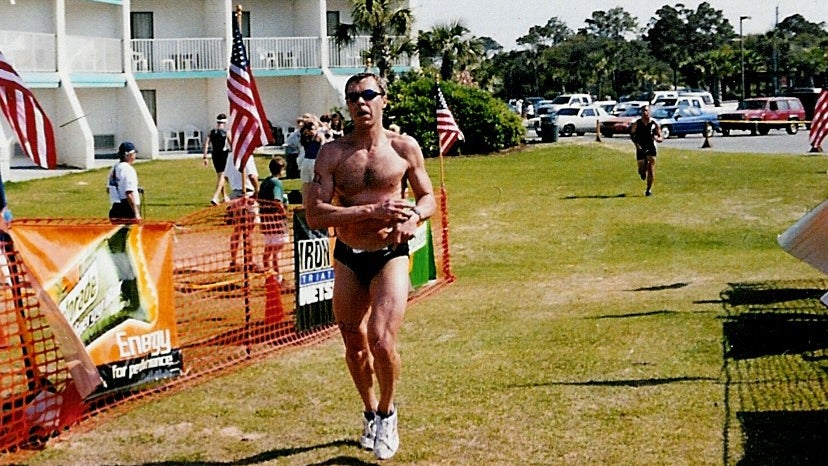This 70-Year-Old Has Completed Over 350 Triathlons in 30 Years

If not for the numbers on his calf, you could easily mistake Mark Stecher’s Speedo-clad Adonis physique for that of a 25-year-old.
But Stecher is 70 and the most remarkable things about him are neither his age nor his figure.
When we spoke, the Aurora, Colorado healthcare consultant was preparing for his 366th triathlon. He believes there is only one age grouper in the U.S. who has completed more races than he has, but he’s not trying to set a record.
He simply loves the sport.
What began as a 40th birthday gift to himself become a way of life. “I thought I’d do one race and be done with it.” But after taking third in his age group at his debut race, he dove in headfirst. It wasn’t just his competitive spirit driving him. “I started to realize they were just the most marvelous people out there doing endurance sports. I just wanted to be part of that scene.”
Three decades later, he’s a staple on the triathlon scene. Over the years, strong results have found him racing on national and international stages. He typically races at least once per weekend during the summer and competes in events like duathlons and snowshoe races through the winter. On an average week, he squeezes in 30 hours of training and racing, including flexibility and strength work amidst about three hours a day of part-time work.
Words like “off-season” and “taper” aren’t in Mark’s vocabulary. Though he always takes a day off two days before a race, without a workout, his body “itches and twitches.” Post-race, he does a light workout to ease back into training. While he thinks it’s crucial to “feel his way through” that active recovery session, he’s strict when it comes to the mental aspect of his training. “You have to put the race you just finished out of your mind.”
Mark’s unwavering commitment is responsible not just for his triathlon success, but also for saving his life. In 2013 he was riding his bike when a dump truck hit him, resulting in life-threatening bleeding and serious orthopedic trauma. His surgeon told him he’d never have survived if not for his extreme level of fitness. The surgeon also said Mark may never run again. “That was the day I decided that I would resume participation in running and multi-sport events.”
Used to standing on the podium, Mark now stood with the support of a walker. Instead of intervals in the pool, he did aqua therapy with a physical therapist. As his fitness returned, Mark faced yet another obstacle; he needed a hip replacement. But a second round of rehab couldn’t deter him from his goal. The fact that he’d already been through it only buoyed his confidence. “I was ahead of the game, you might say.”
In October 2015, over two years after his accident, Mark’s goal became a reality. Of his 300+ finishes, this one stands out. “I finished dead last but it was the most amazing experience.” It turned out, the volunteers had been told his story. He recalls, “Every time I went around the loop on the bike, they were shouting ‘SURVIVOR! SURVIVOR!’”
Though the accident compromised Mark’s performance it deepened his involvement in the triathlon community. While his willpower served him well, without community support, he says he could never have raced again. He advises: “Don’t think you can do it all by yourself.” His wife, Anne, was his greatest supporter. Mark also relied on friends, family, neighbors, work associates, and even acquaintances who approached him at the gym, who offered rides, meals, and prayers.
As the recipient of so much kindness, Mark is on a mission to help other athletes who’ve suffered a traumatic accident. “I call up and say, ‘Hi, I’m Mark. I’ve been through something similar. I know that not everybody’s situation is the same but, you know, we may have something in common here. Just tell me what your experience is and what I can do to help you through it.’”
Whether you’ve been through a traumatic event or not, Mark’s training advice is simple. He advocates organizing your life to accommodate training, making time for friends and family, forgiving yourself when you miss a session, and rewarding yourself when you have a great workout. “And I don’t mean by eating cookies. It may be buying a new pair of goggles because you needed them anyway.”
Not that Mark needs treats for motivation. These days, he’s thrilled just to have the chance to continue training and racing and hopes to maintain his current training and racing schedule into his 80’s.